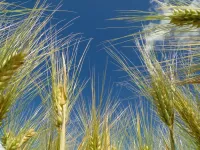(Press-News.org) As a social media user, you can be eager to share content. You can also try to judge whether it is true or not. But for many people it is difficult to prioritize both these things at once.
That’s the conclusion of a new experiment led by MIT scholars, which finds that even considering whether or not to share news items on social media reduces people’s ability to tell truths from falsehoods.
The study involved asking people to assess whether various news headlines were accurate. But if participants were first asked whether they would share that content, they were 35 percent worse at telling truths from falsehoods. Participants were also 18 percent less successful at discerning truth when asked about sharing right after evaluating them.
“Just asking people whether they want to share things makes them more likely to believe headlines they wouldn’t otherwise have believed, and less likely to believe headlines they would have believed,” says David Rand, a professor at the MIT Sloan School of Management and co-author of a new paper detailing the study’s results. “Thinking about sharing just mixes them up.”
The results suggest an essential tension between sharing and accuracy in the realm of social media. While people’s willingness to share news content and their ability to judge it accurately can both be bolstered separately, the study suggests the two things do not positively reinforce each other when considered at the same time.
“The second you ask people about accuracy, you’re prompting them, and the second you ask about sharing, you’re prompting them,” says Ziv Epstein, a PhD student in the Human Dynamics group at the MIT Media Lab and another of the paper’s co-authors. “If you ask about sharing and accuracy at the same time, it can undermine people’s capacity for truth discernment.”
The paper, “The social media context interferes with truth discernment,” will be published in Science Advances. The authors are Epstein; Nathaniel Sirlin, a research assistant at MIT Sloan; Antonio Arechar, a professor at the Center for Research and Teaching in Economics, in Aguascalientes, Mexico; Gordon Pennycook, an associate professor at the University of Regina; and Rand, who is the Erwin H. Schell Professor, a professor of management science and of brain and cognitive sciences, and the director of MIT’s Applied Cooperation Team.
To carry out the study, the researchers conducted two waves of online surveys of 3,157 Americans whose demographic characteristics approximated the U.S. averages for age, gender, ethnicity, and geographic distribution. All participants use either Twitter or Facebook. People were shown a series of true and false headlines about politics and the Covid-19 pandemic, and were randomly assigned to two groups. At times they were asked only about accuracy or only about sharing content; at other times they were asked about both, in differing orders. From this survey design, the scholars could determine the effect that being asked about sharing content has on people’s news accuracy judgments.
In conducting the survey, the researchers were exploring two hypotheses about sharing and news judgements. One possibility is that being asked about sharing could make people more discerning about content because they would not want to share misleading news items. The other possibility is that asking people about sharing headlines feeds into the generally distracted condition in which consumers view news while on social media, and therefore detracts from their ability to tell truth from falsity.
“Our results are different from saying, ‘If I told you I was going to share it, then I say I believe it because I don’t want to look like I shared something I don’t believe,” Rand says. “We have evidence that that’s not what is going on. Instead, it’s about more generalized distraction.”
The research also examined partisan leanings among participants and found that when it came to Covid-19 headlines, being prompted about sharing affected the judgment of Republicans more than Democrats, although there was not a parallel effect for political news headlines.
“We don’t really have an explanation for that partisan difference,” Rand says, calling the issue “an important direction for future research.”
As for the overall findings, Rand suggests that, as daunting as the results might sound, they also contain some silver linings. One conclusion of the study is that people’s belief in falsehoods may be more influenced by their patterns of online activity than by an active intent to deceive others.
“I think there’s in some sense a hopeful take on it, in that a lot of the message is that people aren’t immoral and purposely sharing bad things,” Rand says. “And people aren’t totally hopeless. But more it’s that the social media platforms have created an environment in which people are being distracted.”
Eventually, the researchers say, those social media platforms could be redesigned to create settings in which people are less likely to share misleading and inaccurate news content.
“There are ways of broadcasting posts that aren’t just focused on sharing,” Epstein says.
He adds: “There’s so much room to grow and develop and design these platforms that are consistent with our best theories about how we process information and can make good decisions and form good beliefs. I think this is an exciting opportunity for platform designers to rethink these things as we take a step forward.”
The project was funded in part by the MIT Sloan Latin America Office; the Ethics and Governance of Artificial Intelligence Initiative of the Miami Foundation; the William and Flora Hewlett Foundation; the Reset initiative of Luminate; the John Templeton Foundation; the TDF Foundation, the Canadian Institutes of Health Research; the Social Sciences and Humanities Research Council of Canada; the Australian Research Council; Google; and Facebook.
###
Written by Peter Dizikes, MIT News Office
END
On social media platforms, more sharing means less caring about accuracy
An MIT-led study reveals a core tension between the impulse to share news and to think about whether it is true
2023-03-03
ELSE PRESS RELEASES FROM THIS DATE:
The world’s first horse riders
2023-03-03
The researchers discovered evidence of horse riding by studying the remains of human skeletons found in burial mounds called kurgans, which were between 4500-5000 years old. The earthen burial mounds belonged to the Yamnaya culture. The Yamnayans had migrated from the Pontic-Caspian steppes to find greener pastures in today´s countries of Romania and Bulgaria up to Hungary and Serbia.
Yamnayans were mobile cattle and sheep herders, now believed to be on horseback.
“Horseback-riding seems to have evolved not long ...
Detecting anaemia earlier in children using a smartphone
2023-03-03
Researchers at UCL and University of Ghana have successfully predicted whether children have anaemia using only a set of smartphone images.
The study, published in PLOS ONE, brought together researchers and clinicians at UCL Engineering, UCLH and Korle Bu Teaching Hospital, Ghana to investigate a new non-invasive diagnostic technique using smartphone photographs of the eye and face.
The advance could make anaemia screening more widely available for children in Ghana (and other low- and middle-income countries) where ...
Israel: the origin of the world's grapevines
2023-03-03
A recent study on the genetic makeup of grapevine has revealed fascinating insights into its domestication and evolution. The study, published in the journal Science, suggests that the harsh climate during the Pleistocene era resulted in the fragmentation of wild ecotypes, which paved the way for the domestication of grapevine about 11,000 years ago in the Near East (Israel) and the Caucasus.
The research team sequenced the genomes of 3525 grapevine accessions (2503 V. vinifera (domesticated) and 1022 V. sylvestris (wild) accessions of grapevine, to identify the genetic changes that occurred during domestication and evolution of grapevine in Euro-Asia.
According to the study, ...
IPK researchers provide insights into grain number determination mechanism of barley
2023-03-03
Modifying inflorescences with higher grain capacity is vital for crop grain production. One recurring target is to select inflorescences with more branches or floral structures. Prominent examples include genes affecting floral identity or meristem determinacy, for which natural or induced variants profoundly change floral primordium number. Yet for temperate cereal crops, such as wheat and barley, excessive floral structures can result in a degeneration penalty due to the indeterminate nature of meristems. On the other hand, the manifestation of this reproductive potential can be accentuated by environmental ...
Pitt and UCI researchers receive grant to understand patient reactions to Alzheimer's disease diagnoses
2023-03-03
University of Pittsburgh and University of California, Irvine (UCI) researchers have received funding from the National Institute of Aging to advance understanding of real-world patient and family member reactions to biomarker-informed Alzheimer’s disease and related disorders diagnoses.
The grant, which is expected to total $3.5 million over up to five years, will enable researchers to better understand the experiences and potential psychological impact of receiving Alzheimer’s biomarker results. These findings will provide important information for supporting patients and their families and inform best practices in the rapidly evolving state-of-the-art diagnostic ...
Oncotarget | Unveiling the non-canonical functions of EZH2 in prostate cancer
2023-03-03
“In summary, both articles by Yi et al. emphasized the significance of non-canonical functions of EZH2 during PCa [prostate cancer] development [...]”
BUFFALO, NY- March 3, 2023 – A new editorial paper was published in Oncotarget's Volume 14 on February 11, 2023, entitled, “Unveiling the non-canonical functions of EZH2 in prostate cancer.”
Prostate cancer (PCa) is ranked as the second leading cause of cancer-related death among American men excluding skin cancer. ...
Adding antipsychotic med to antidepressant may help older adults with treatment-resistant depression
2023-03-03
For older adults with clinical depression that has not responded to standard treatments, adding the drug aripiprazole (brand name Abilify) to an antidepressant they’re already taking is more effective than switching from one antidepressant to another, according to a new multicenter study led by Washington University School of Medicine in St. Louis.
Aripiprazole originally was approved by the FDA in 2002 as a treatment for schizophrenia but also has been used in lower doses as an add-on treatment for clinical depression ...
American Foregut Society white paper recommends expanding endoscopic classification of esophogastric junction integrity beyond hill grade
2023-03-03
A new white paper by the American Foregut Society recommends expanding the classification of the esophagogastric junction (EGJ) to increase an assessment of the axial hiatal hernia length, hiatal hernia aperture diameter, and presence or absence of the flap value making it more comprehensive. The white paper is published in the December issue of Foregut, the only subscription journal focused exclusively on foregut disease linking medical, endoscopic, and surgical disciplines.
Gastrointestinal reflux disease ...
A good night’s sleep may make it easier to stick to exercise and diet goals, study found
2023-03-03
Research Highlights:
People who had higher scores for sleep health — based on regularity, satisfaction, alertness, timing, efficiency and duration — during a 12-month weight loss program were more likely to follow the caloric intake and exercise components of the program in comparison to peers who scored lower for sleep health.
People with better sleep health attended more of the program’s group sessions.
Embargoed until 10:15 a.m. CT/11:15 a.m. ET, Friday, March 3, 2023
DALLAS, March 3, 2023 — ...
Grant fuels project to highlight untold history across Appalachia
2023-03-03
From working with Appalachian communities to examining issues of displacement for refugees, two Virginia Tech faculty have made it their life and scholarly mission to recognize the people that society often overlooks.
Now a prestigious national foundation is giving them significant resources to tell the hidden historical stories of communities throughout Southwest Virginia, an opportunity to put their passion into action.
Emily Satterwhite and Katrina Powell received a $3 million grant from the Andrew W. Mellon Foundation for a three-year project to work with communities across the state’s Appalachia region to commemorate neglected histories.
Their project, Monuments ...
LAST 30 PRESS RELEASES:
Hope for global banana farming in genetic discovery
Mirror image pheromones help beetles swipe right
Prenatal lead exposure related to worse cognitive function in adults
Research alert: Understanding substance use across the full spectrum of sexual identity
Pekingese, Shih Tzu and Staffordshire Bull Terrier among twelve dog breeds at risk of serious breathing condition
Selected dog breeds with most breathing trouble identified in new study
Interplay of class and gender may influence social judgments differently between cultures
Pollen counts can be predicted by machine learning models using meteorological data with more than 80% accuracy even a week ahead, for both grass and birch tree pollen, which could be key in effective
Rewriting our understanding of early hominin dispersal to Eurasia
Rising simultaneous wildfire risk compromises international firefighting efforts
Honey bee "dance floors" can be accurately located with a new method, mapping where in the hive forager bees perform waggle dances to signal the location of pollen and nectar for their nestmates
Exercise and nutritional drinks can reduce the need for care in dementia
Michelson Medical Research Foundation awards $750,000 to rising immunology leaders
SfN announces Early Career Policy Ambassadors Class of 2026
Spiritual practices strongly associated with reduced risk for hazardous alcohol and drug use
Novel vaccine protects against C. diff disease and recurrence
An “electrical” circadian clock balances growth between shoots and roots
Largest study of rare skin cancer in Mexican patients shows its more complex than previously thought
Colonists dredged away Sydney’s natural oyster reefs. Now science knows how best to restore them.
Joint and independent associations of gestational diabetes and depression with childhood obesity
Spirituality and harmful or hazardous alcohol and other drug use
New plastic material could solve energy storage challenge, researchers report
Mapping protein production in brain cells yields new insights for brain disease
Exposing a hidden anchor for HIV replication
Can Europe be climate-neutral by 2050? New monitor tracks the pace of the energy transition
Major heart attack study reveals ‘survival paradox’: Frail men at higher risk of death than women despite better treatment
Medicare patients get different stroke care depending on plan, analysis reveals
Polyploidy-induced senescence may drive aging, tissue repair, and cancer risk
Study shows that treating patients with lifestyle medicine may help reduce clinician burnout
Experimental and numerical framework for acoustic streaming prediction in mid-air phased arrays
[Press-News.org] On social media platforms, more sharing means less caring about accuracyAn MIT-led study reveals a core tension between the impulse to share news and to think about whether it is true




